Related Research Articles

Francis Ford Coppola is an American film director, producer, and screenwriter. He is considered one of the major figures of the New Hollywood filmmaking movement of the 1960s and 1970s. Coppola is the recipient of five Academy Awards, six Golden Globe Awards, two Palmes d'Or and a British Academy Film Award (BAFTA).
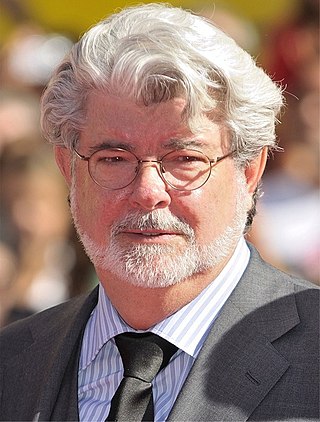
George Walton Lucas Jr. is an American filmmaker. Lucas is best known for creating the Star Wars and Indiana Jones franchises and founding Lucasfilm, LucasArts, Industrial Light & Magic and THX. He served as chairman of Lucasfilm before selling it to The Walt Disney Company in 2012. Lucas is one of history's most financially successful filmmakers and has been nominated for four Academy Awards. His films are among the 100 highest-grossing movies at the North American box office, adjusted for ticket-price inflation. Lucas is considered to be one of the most significant figures of the 20th-century New Hollywood movement, and a pioneer of the modern blockbuster.

THX 1138 is a 1971 American social science fiction film co-written and directed by George Lucas in his directorial debut. Produced by Francis Ford Coppola and co-written by Walter Murch, the film stars Robert Duvall and Donald Pleasence, with Don Pedro Colley, Maggie McOmie and Ian Wolfe in supporting roles. The film is set in a dystopian future in which the populace is controlled through android police and mandatory use of drugs that suppress emotions.
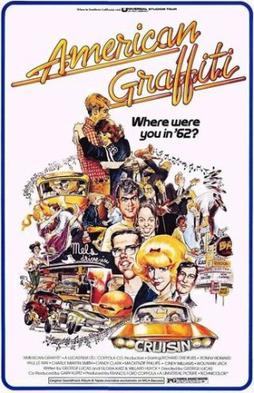
American Graffiti is a 1973 American coming-of-age comedy-drama film directed by George Lucas, produced by Francis Ford Coppola, written by Willard Huyck, Gloria Katz and Lucas, and starring Richard Dreyfuss, Ron Howard, Paul Le Mat, Harrison Ford, Charles Martin Smith, Cindy Williams, Candy Clark, Mackenzie Phillips, Bo Hopkins, and Wolfman Jack. Set in Modesto, California, in 1962, the film is a study of the cruising and early rock 'n' roll cultures popular among Lucas's age group at that time. Through a series of vignettes, it tells the story of a group of teenagers and their adventures over the course of a night.
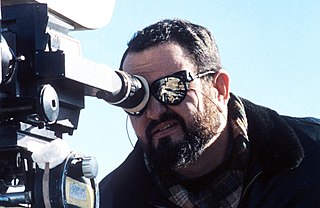
John Frederick Milius is an American screenwriter, film director, and producer. He was a writer for the first two Dirty Harry films, received an Academy Award nomination as screenwriter of Apocalypse Now (1979), and wrote and directed The Wind and the Lion (1975), Conan the Barbarian (1982), and Red Dawn (1984). He later served as the co-creator of the Primetime Emmy Award-winning television series Rome (2005–2007).

An independent film, independent movie, indie film, or indie movie is a feature film or short film that is produced outside the major film studio system, in addition to being produced and distributed by independent entertainment companies. Independent films are sometimes distinguishable by their content and style and the way in which the filmmakers' personal artistic vision is realized. Usually, but not always, independent films are made with considerably lower budgets than major studio films.

American Zoetrope is a privately run American film production company, centered in San Francisco, California and founded by Francis Ford Coppola and George Lucas.
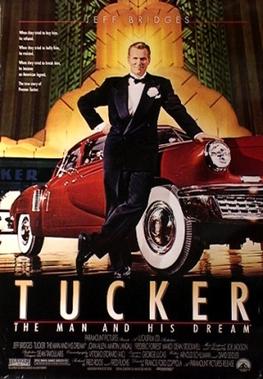
Tucker: The Man and His Dream is a 1988 American biographical comedy-drama film directed by Francis Ford Coppola, starring Jeff Bridges as inventor Preston Tucker. The film recounts Tucker's story and his attempt to produce and market the Tucker 48, which was met with scandal between the Big Three automobile manufacturers and accusations of stock fraud from the U.S. Securities and Exchange Commission. Joan Allen, Martin Landau, Elias Koteas, Frederic Forrest and Christian Slater appear in supporting roles. Landau won the Golden Globe Award for Best Supporting Actor and was nominated for the Academy Award in the same category.

Roman François Coppola is an American director, screenwriter, producer. He is the son of Francis Ford Coppola and Eleanor Coppola.
A zoetrope is a device used for animation. It makes motion pictures using rotating images viewed through occasional slits to give it a moving feel.
Marcia Lou Lucas is an American film editor. She is best known for her work editing the Star Wars trilogy (1977–1983) as well as other films by her then-husband George Lucas: THX-1138 (1971) and American Graffiti (1973). She also edited Martin Scorsese's Alice Doesn't Live Here Anymore (1973), and New York, New York (1977).
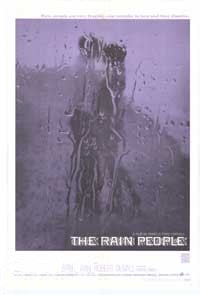
The Rain People is a 1969 American road drama film written and directed by Francis Ford Coppola, and starring Shirley Knight, James Caan and Robert Duvall. The film centers on a middle-class housewife (Knight), who runs away from her husband after learning she is pregnant.
Willard Miller Huyck, Jr. is an American retired screenwriter, director and producer, best known for his association with George Lucas.
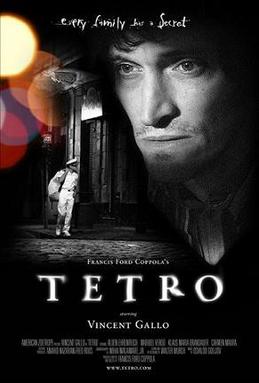
Tetro is a 2009 drama film written, produced and directed by Francis Ford Coppola and starring Vincent Gallo, Alden Ehrenreich and Maribel Verdú. Filming took place in 2008 in Buenos Aires, Patagonia, and Spain. An international co-production between the United States, Argentina, Spain and Italy, the film received a limited theatrical release in the U.S. on June 11, 2009.
John Korty was an American film director and animator, best known for the television film The Autobiography of Miss Jane Pittman and the documentary Who Are the DeBolts? And Where Did They Get Nineteen Kids?, as well as the theatrical animated feature Twice Upon a Time. He has won an Academy Award for Best Documentary Feature and several other major awards. He is described by the film critic Leonard Maltin as "a principled filmmaker who has worked both outside and within the mainstream, attempting to find projects that support his humanistic beliefs".
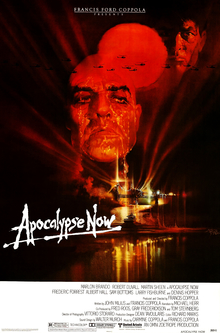
Apocalypse Now is a 1979 American epic war film produced and directed by Francis Ford Coppola. The screenplay, co-written by Coppola, John Milius and Michael Herr, is loosely based on the 1899 novella Heart of Darkness by Joseph Conrad, with the setting changed from late 19th-century Congo to the Vietnam War. The film follows a river journey from South Vietnam into Cambodia undertaken by Captain Willard, who is on a secret mission to assassinate Colonel Kurtz, a renegade Special Forces officer who is accused of murder and presumed insane. The ensemble cast also features Robert Duvall, Frederic Forrest, Albert Hall, Sam Bottoms, Laurence Fishburne and Dennis Hopper.

George Lucas is an American film director, screenwriter, producer, editor, and entrepreneur. His most well known work includes both the Star Wars and Indiana Jones franchises and establishing Lucasfilm. In addition to producing feature films, he has also created television series and written books.
Scott Bartlett was one of the premiere abstract/experimental cinematic artists of the late 1960s and the 1970s. His acclaimed work, such as his intense abstract 16mm movie Moon 1969, is greatly admired by many movie directors, including Francis Ford Coppola and George Lucas. His notable abstract movies and visual avant-garde motion pictures includes Serpent, Medina, Metanomen, Lovemaking, and the poignant interior documentary 1970. His 1967-1972 experiment OffOn, shot on 16mm, was groundbreaking for its use of new video imagery technologies.

Todd Boekelheide is an American composer based in the San Francisco Bay Area, best known for his work scoring documentary films. He won an Academy Award for Best Sound and was nominated for another in the same category.
A list of books and essays about Francis Ford Coppola:
References
Annotations
- ↑ While according to Pollock, Coppola gave Lucas the money for the documentary, he is not credited in the film's credits. [1]
- ↑ Myles and Pye incorrectly list Filmmaker as lasting forty minutes. [2]
- ↑ Marcia Griffin (Marcia Lucas) is not credited in the film's credits but is credited in Pollock's book as well as Rubin's. [7] [8]
Footnotes
- 1 2 3 4 5 6 Pollock 1999, p. 76.
- ↑ Myles & Pye 1979, p. 252.
- 1 2 3 4 Schumacher 1999, p. 67.
- ↑ Rubin 2006, p. 26.
- 1 2 Hearn 2005, p. 31.
- ↑ Rubin 2006, p. 25.
- 1 2 3 Pollock 1999, p. 77.
- 1 2 Rubin 2006, p. 30.
- ↑ Myles & Pye 1979, p. 116.
- ↑ Cahill, Greg (October 1–7, 1998). "A Life in Film: Mark Fishkin ushers in Mill Valley Film Fest". Sonoma County Independent. Metro Publishing. Retrieved 2013-01-26.
In October 1977, [Mark Fishkin] and fellow film buffs Rita Cahill and Lois Cole organized a three-day film festival. It featured three film tributes, Coppola's Rain People, and George Lucas' The Filmmaker.
- 1 2 "Mill Valley Film Festival 1978" (Press release). Mill Valley, CA. 1978.
Sunday, August 12 […] George Lucas created the documentary on the making of The Rain People while assisting Mr. Coppola on the production. This is a rare screening of one of Mr. Lucas's first films, which Coppola candidly admits 'may be better than the picture'.
- ↑ Cowie, Peter (1994) [First published in 1989]. "Independence and the Dream of Zoetrope". Coppola: A Biography (Updated; Paperback ed.). Cambridge, Massachusetts: Da Capo Press. p. 53. ISBN 0-306-80598-7.
George Lucas, then "a skinny kid" who had met Francis on the set of Finian's Rainbow, wanted to work with The Rain People. Francis let him make a documentary about the shooting, and the result, entitled Filmmaker, remains one of the most important analyses of Coppola's craft and incipient philosophy. It describes the romantic agony of living in trailers and converted buses, arguing with guilds, unions, and local authorities, and all the time fighting over the phone with the studio backing the production.
- ↑ Coppola, Francis Ford (Interviewee) (June 11, 2009). Tetro: How to Make Movies (Behind-The-Scenes Featurette; Web Video). YouTube. Event occurs at 50 seconds. Archived from the original on 2021-12-21. Retrieved 2012-02-08.
I bought this dolly over thirty years ago […] it really warms my heart, the fact that I saved this piece of equipment that I've used through thick and thin. It was used it on The Rain People.
- ↑ Pollock 1999, p. 308.
- ↑ Kline, Sally, ed. (1999). George Lucas Interviews (Paperback ed.). Jackson, Mississippi: University Press of Mississippi. p. xxi. ISBN 978-1-57806-125-9.
Bibliography
- Hearn, Marcus (2005). "A Hard Road (1944–1971)". The Cinema of George Lucas (Hardcover; Alk. paper ed.). New York, NY: Harry N. Abrams. p. 31. ISBN 978-0-8109-4968-3. LCCN 2004020411.
- Myles, Lynda; Pye, Michael (1979). "George Lucas". The Movie Brats: How The Film Generation Took Over Hollywood (Paperback; First ed.). New York, NY: Holt, Rinehart, Winston (published February 1984). pp. 116, 252. ISBN 978-0-03-042676-6. LCCN 78011901.
- Pollock, Dale (May 31, 1999) [First published 1983]. "Coping with Coppola". Skywalking: The Life and Films of George Lucas (Paperback; Updated ed.). New York, NY: Da Capo Press. pp. 76, 77, 308. ISBN 978-0-306-80904-0. LCCN 90037372.
- Rubin, Michael (2006). "Road Trip". Droidmaker: george lucas and the digital revolution (Hardcover ed.). Gainesville, Florida: Triad Publishing. pp. 25, 26, 30. ISBN 978-0-937404-67-6. LCCN 2005019257.
- Schumacher, Michael (1999). "American Zoetrope". Francis Ford Coppola: A Filmmaker's Life (Hardcover; First ed.). New York, NY: Crown. p. 67. ISBN 978-0-517-70445-5. LCCN 99-12750.